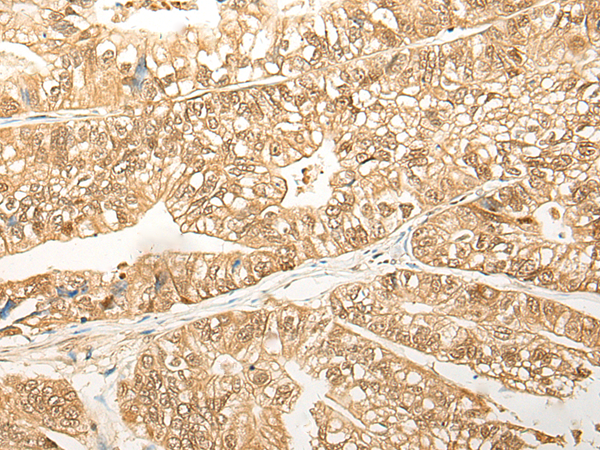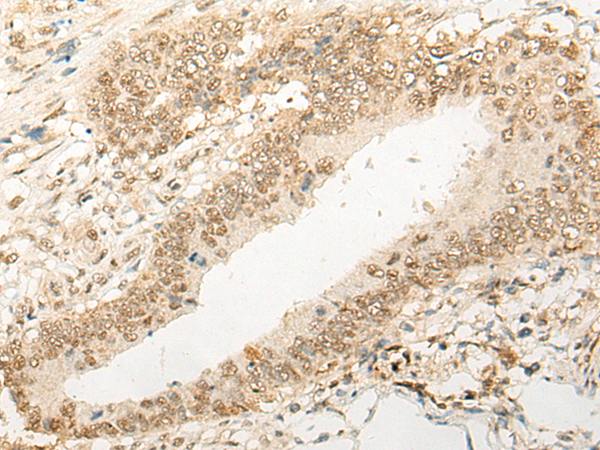

| WB | 咨询技术 | Human,Mouse,Rat |
| IF | 咨询技术 | Human,Mouse,Rat |
| IHC | 1/25-1/100 | Human,Mouse,Rat |
| ICC | 技术咨询 | Human,Mouse,Rat |
| FCM | 咨询技术 | Human,Mouse,Rat |
| Elisa | 1/5000-1/10000 | Human,Mouse,Rat |
| Aliases | HN3; HsN3; PROS26; PROS-26 |
| Host/Isotype | Rabbit IgG |
| Antibody Type | Primary antibody |
| Storage | Store at 4°C short term. Aliquot and store at -20°C long term. Avoid freeze/thaw cycles. |
| Species Reactivity | Human, Mouse, Rat |
| Immunogen | Fusion protein of human PSMB4 |
| Formulation | Purified antibody in PBS with 0.05% sodium azide and 50% glycerol. |
+ +
以下是关于PSMB4抗体的3篇参考文献示例(内容为模拟概括,建议通过学术数据库核实具体文献):
---
1. **文献名称**: *Proteasome subunit PSMB4 regulates mitochondrial dynamics and cancer metastasis*
**作者**: Chen L, et al.
**摘要**: 本研究通过PSMB4特异性抗体发现其在多种癌细胞中高表达,并揭示其通过调控线粒体分裂蛋白Drp1的稳定性促进肿瘤转移,提示PSMB4可作为癌症治疗靶点。
2. **文献名称**: *PSMB4 interacts with autophagy receptor p62 to modulate aggregation-prone protein degradation*
**作者**: Tanaka K, et al.
**摘要**: 利用PSMB4抗体进行免疫共沉淀实验,证明PSMB4与自噬受体p62直接互作,协同蛋白酶体和自噬途径清除神经退行性疾病中的异常蛋白聚集体。
3. **文献名称**: *Differential expression of PSMB4 in immune cells revealed by monoclonal antibody-based screening*
**作者**: Smith J, et al.
**摘要**: 开发了一种高特异性抗PSMB4单克隆抗体,通过流式细胞术和免疫组化分析发现PSMB4在活化T细胞和树突状细胞中表达显著上调,提示其在免疫应答中的潜在作用。
---
建议通过PubMed或Google Scholar以关键词“PSMB4 antibody”、“PSMB4 function”或“PSMB4 disease”检索最新文献,并优先选择近5年发表的论文以获取前沿进展。
The PSMB4 (Proteasome 20S Subunit Beta 4) antibody is a research tool targeting the β7 subunit of the 20S proteasome core, a key component of the ubiquitin-proteasome system responsible for intracellular protein degradation. PSMB4. encoded by the PSMB4 gene, is a constitutive subunit critical for the proteasome's chymotrypsin-like activity, cleaving hydrophobic residues in substrate proteins. This subunit is essential for maintaining cellular homeostasis, regulating processes like cell cycle progression, apoptosis, and immune response via antigen presentation through MHC class I molecules.
Antibodies against PSMB4 are widely used in studies exploring proteasome dysfunction linked to diseases such as cancer, neurodegenerative disorders (e.g., Alzheimer’s), and autoimmune conditions. They enable detection of PSMB4 expression levels via techniques like Western blotting, immunohistochemistry, and flow cytometry, helping researchers assess proteasome activity or inhibition in experimental models. Commercial PSMB4 antibodies are typically raised in hosts like rabbits or mice, validated for specificity across human, mouse, and rat samples.
Recent studies highlight PSMB4's potential as a biomarker in cancers, where its overexpression correlates with tumor progression and drug resistance. Investigating PSMB4 dynamics also aids in developing proteasome-targeted therapies, such as inhibitors for multiple myeloma. However, variability in antibody performance (e.g., cross-reactivity) necessitates careful validation for experimental accuracy.
×